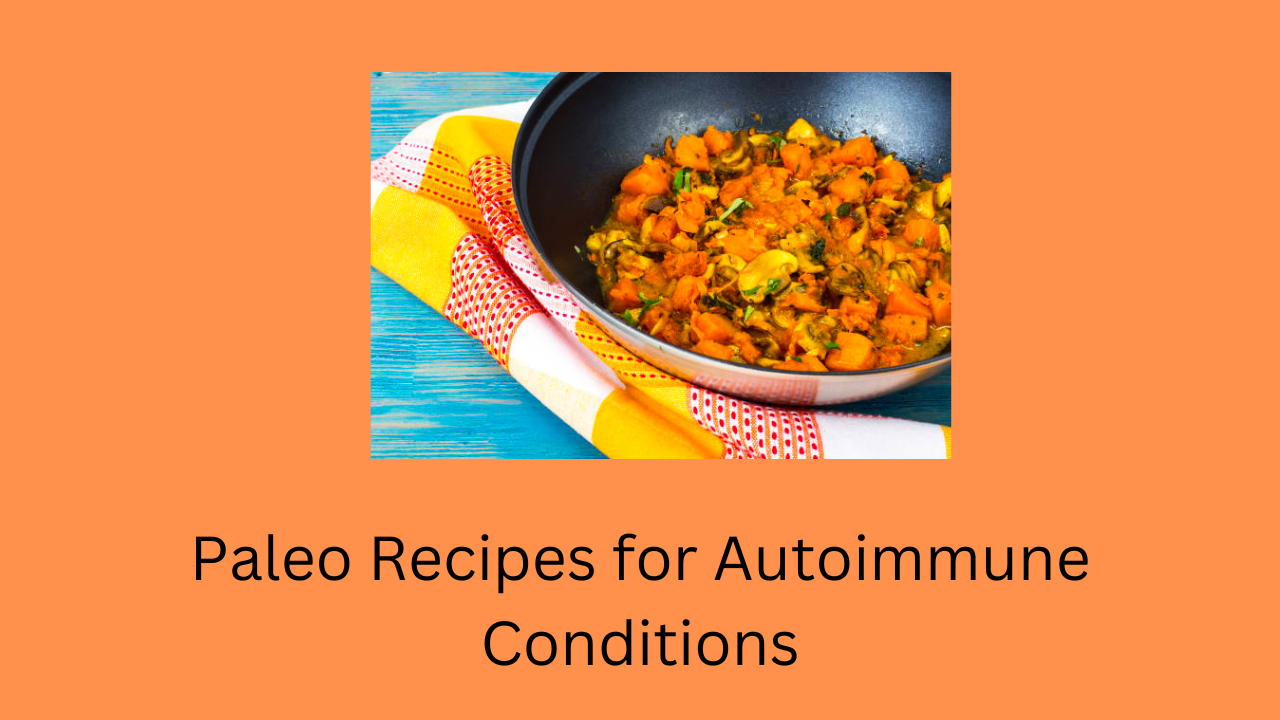Autoimmune conditions can be debilitating, affecting millions of individuals worldwide. These conditions arise when the immune system, which is designed to protect the body, mistakenly attacks its tissues and organs.
Managing autoimmune diseases often involves a multifaceted approach, and one dietary strategy gaining attention for its potential therapeutic benefits is the Paleo diet.
In this article, I will show you how the Paleo diet can serve as a valuable tool for individuals with autoimmune conditions and share some delicious Paleo recipes tailored to support their well-being.
What is Autoimmune Conditions
Conditions like rheumatoid arthritis, lupus, celiac disease, and multiple sclerosis are just a few examples of the over 100 autoimmune disorders that exist. These conditions can affect various parts of the body, leading to inflammation, pain, and discomfort. While the exact causes of autoimmune diseases are complex and not entirely understood, it’s increasingly recognized that diet and lifestyle play significant roles in their management.
What are Paleo Diet
The Paleo diet, also known as the “caveman diet” or “ancestral diet,” is built on the premise of eating whole, unprocessed foods that our Paleolithic ancestors would have consumed. This approach eliminates grains, dairy, legumes, and processed sugars, focusing instead on nutrient-dense options like lean meats, fish, fruits, vegetables, nuts, and seeds.
These choices are believed to help manage autoimmune conditions by reducing inflammation and providing essential nutrients.
Benefits of Paleo Diet for Autoimmune Conditions
The Paleo diet, which emphasizes whole, unprocessed foods and eliminates grains, dairy, legumes, and processed sugars, offers several potential benefits for individuals with autoimmune conditions:
- 1. Reduced Inflammation:
- Chronic inflammation is a key driver of autoimmune diseases. The Paleo diet’s focus on whole, anti-inflammatory foods may help reduce overall inflammation in the body, potentially alleviating symptoms.
- 2. Nutrient Density:
The diet encourages the consumption of nutrient-dense foods like fruits, vegetables, lean meats, and nuts, providing essential vitamins, minerals, and antioxidants that support immune system function and overall health.
- 3. Gut Health:
Emerging research suggests a strong connection between gut health and autoimmune diseases. The Paleo diet promotes gut health by emphasizing fiber-rich fruits and vegetables while avoiding potential gut irritants like processed foods and dairy.
- 4. Elimination of Potential Triggers:
By excluding grains, dairy, and processed sugars, the Paleo diet removes potential dietary triggers that may exacerbate autoimmune symptoms in some individuals.
- 5. Balanced Blood Sugar Levels:
Stable blood sugar levels are crucial for managing autoimmune symptoms, and the avoidance of processed sugars in the Paleo diet can help achieve this balance.
- 6. Weight Management:
Many individuals with autoimmune diseases experience weight fluctuations. The Paleo diet, with its focus on whole, satiating foods, can support weight management.
- 7. Improved Nutrient Absorption:
The elimination of grains and legumes, which contain anti-nutrients like lectins and phytates, may enhance the absorption of nutrients in the digestive tract.
- 8. Potential Reduction in Symptom Severity:
While individual responses vary, some people with autoimmune diseases report a reduction in symptom severity and improved quality of life after adopting the Paleo diet.
- 9. Customization:
The Paleo diet is flexible and can be customized to suit individual needs and preferences. It allows for variations such as Paleo AIP (Autoimmune Protocol), which further restricts certain foods to address autoimmune symptoms.
- 10. Sustainable Lifestyle Changes:
The Paleo diet encourages a long-term shift toward healthier eating habits, potentially leading to sustained improvements in autoimmune symptoms and overall well-being.
It’s essential to note that the effectiveness of the Paleo diet can vary among individuals and autoimmune conditions. Before making significant dietary changes, it’s crucial to consult with a healthcare professional, such as a registered dietitian or a healthcare provider with expertise in nutrition and autoimmune conditions. They can provide personalized guidance, monitor progress, and help tailor the diet to individual needs and medical considerations. Additionally, a holistic approach to managing autoimmune diseases should include medication, stress management, regular medical check-ups, and a supportive healthcare team.
Paleo Recipes For Autoimmune Conditions
Here are some Paleo recipes tailored for individuals with autoimmune conditions:
1. Turmeric-Spiced Roasted Vegetables:

- Toss a mix of root vegetables like sweet potatoes, carrots, and beets with olive oil, turmeric, garlic powder, and salt. Roast until tender for a flavorful side dish.
2. Lemon Herb Baked Chicken:

- Marinate chicken breasts in a mixture of fresh lemon juice, olive oil, garlic, and your choice of herbs (such as rosemary or thyme). Bake until cooked through.
3. Cucumber and Avocado Salad:

- Combine sliced cucumbers, diced avocado, red onion, fresh cilantro, and a drizzle of olive oil and lemon juice for a refreshing salad.
4. Garlic-Ginger Salmon:

- Mix minced garlic, grated ginger, coconut aminos (a Paleo-friendly alternative to soy sauce), and a touch of honey. Brush this mixture onto salmon fillets and broil until flaky.
5. Butternut Squash Soup:

- Simmer butternut squash cubes with onions, garlic, and homemade bone broth. Blend until smooth, and season with salt, pepper, and a dash of coconut milk.
6. Cauliflower Rice Stir-Fry:

- Sauté cauliflower rice with mixed vegetables, your choice of protein (like chicken or shrimp), and coconut aminos for a grain-free stir-fry.
7. Zucchini Noodles with Pesto:

- Create “zoodles” from zucchini using a spiralizer and toss with a dairy-free pesto made from fresh basil, pine nuts, garlic, olive oil, and nutritional yeast.
8. Paleo Meatballs:

- Combine ground meat (such as beef or turkey), finely chopped onions, garlic, and Italian seasoning. Form into meatballs and bake or pan-fry until cooked through. Serve with a homemade tomato sauce.
9. Baked Sweet Potato Fries:

- Slice sweet potatoes into fries, toss with olive oil, paprika, and sea salt, and bake until crispy.
10. Mixed Berry Smoothie Bowl:

- Blend frozen mixed berries with a ripe banana and coconut milk. Pour the smoothie into a bowl and top with fresh berries, sliced almonds, and shredded coconut.
11. Avocado Chocolate Mousse:

- Blend ripe avocados with unsweetened cocoa powder, a sweetener of your choice (like honey or maple syrup), and a splash of almond milk for a creamy and dairy-free dessert.
12. Paleo Banana Bread:

- Make banana bread using almond flour, ripe bananas, eggs, and a touch of honey or maple syrup for sweetness.
Remember to customize these recipes to your specific dietary needs and preferences, as autoimmune conditions can vary widely among individuals. Paleo Breakfast Recipes for Autoimmune Conditions
Conclusion
The Paleo diet offers a promising approach for individuals living with autoimmune conditions. By focusing on whole, unprocessed foods that support reduced inflammation, gut health, and optimal nutrient intake, this dietary strategy can play a pivotal role in managing autoimmune diseases. Embrace the healing power of food and consider incorporating these delicious Paleo recipes into your meal plan to support your journey toward better health and well-being.
Remember that while the Paleo diet may provide relief for many individuals with autoimmune conditions, individual responses may vary. It’s essential to work closely with a healthcare professional to tailor your dietary approach to your specific needs and monitor your progress. With the right guidance and delicious recipes in hand, you can embark on a path to improved health and vitality.

